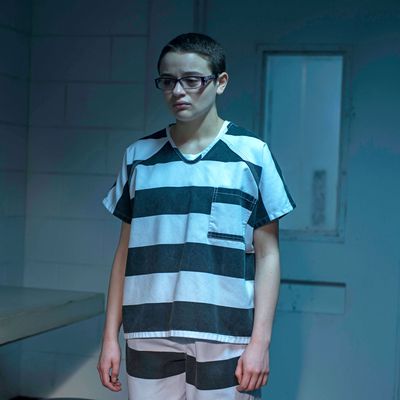
Hulu’s The Act ended its eight-episode run cloaked, as always, in nearly impenetrable sadness, leaving its characters confused and broken, and pointedly refusing to resolve the mixed feelings conjured by its story. Slightly fracturing the chronology of its true-crime narrative, and not for the first time, the final episode began with a flashback to its protagonist and the mother she would subsequently kill looking up at the stars back in 1997. Then it returned us to the scene of the crime, presenting its ghastly murder as an offscreen event (the daughter covering her ears in the bathroom as her boyfriend killed her abusive mother), then followed the couple as they left the past behind and took to the road like lovers in a bloody Hollywood crime fable about geographical and sexual liberation. Then it returned again to the present, for one last bittersweet image of a mother-child reunion.
It was a powerful ending to a story that suffered from a (comparatively mild) case of streaming-drama bloat; the second half of the mini-series sometimes seemed to be covering a lot of ground in great detail that could’ve been just as productively summarized. And it capped off two great lead performances, from Joey King as the abused Gypsy Blanchard and Calum Worthy as her boyfriend Nicholas Godejohn, who claimed to have killed Gypsy’s mother through a split personality named Victor. The killing was meant to free 20-something Gypsy from the prison of her home, where she’d been raised by her mentally disturbed and drug-addicted mother Dee Dee (Patricia Arquette), who was afflicted with Munchausen syndrome by proxy and conditioned the girl to believe she was disabled and physically frail, infantilizing her to the point where she acted much younger than she was.
Gypsy was obsessed with popular culture, but in the end, the most important fantasy operating as subtext in The Act wasn’t the Disney princess dreams or Star Wars films of which she constantly spoke (to the point of asking a detective played by Adam Arkin if she’d get to see The Force Awakens after she’d been interrogated). Rather, it was the story of Bonnie Parker and Clyde Barrow, the gangster couple whose exploits were chronicled in the classic 1967 film and referenced in the title of episode seven. One of the many sad parts of this tale — in addition to, um, the murder — is that this couple barely got to experience any of the freedom they went to such extreme lengths to get. They were so seemingly incapable of empathy (though never made villainous by the script) that it’s questionable whether they could even fully process either the consequences of their actions or the liberation that they were theoretically moving toward.
Bonnie and Clyde’s story was extratextually echoed through the casting of the production: Patricia Arquette starred in another lovers-on-the-run film, True Romance, while Juliette Lewis, who showed up in the final two episodes as Nick’s mother, co-starred in another Bonnie and Clyde variant, Natural Born Killers. Both actresses were instantly and absolutely credible as middle-American working-class white women rather than movie stars. The scene where Lewis’s character insists on her son’s innocence packs a lifetime of protective parental delusion into one scene; and there aren’t enough superlatives to do justice to Arquette, who, between this performance and Showtime’s Escape From Dannemora (in which she played a prison employee who takes two inmates as lovers and helps them escape) is on a post-Boyhood roll that seems likely to put her in the pantheon of defiantly unglamorous character actresses, up there with Ellen Burstyn.
Ultimately, I’m not sure how I feel about The Act or its characters, or for that matter, the variety of tones adopted by showrunners Nick Antosca and Michelle Dean (the latter of whom chronicled the story as a journalist in a widely read BuzzFeed article) to tell this story. Sometimes, as in the climatic music montage, the show seemed to have a great depth of tragic feeling for all of its people, while other times it viewed them with anthropological detachment, presenting a nearly satirical, though convincingly detailed, portrait of midwestern cul-de-sac life. Still other times, it verged on black comedy (Whatever Happened to Baby Jane? was never far from this viewer’s mind), or, thanks mainly to King’s and Arquette’s wigs and makeup and accents, knowingly veered toward midnight movie-horror.
But I don’t think we’re supposed to process something like The Act immediately. I wouldn’t be surprised if, months or years after deciding to turn this disturbing tale into a television series, everyone involved still had mixed emotions about the real-life people behind it, how they were eventually represented in fiction, and what, if anything, the show tells us about the horror, loneliness, and disconnection of modern American life.





